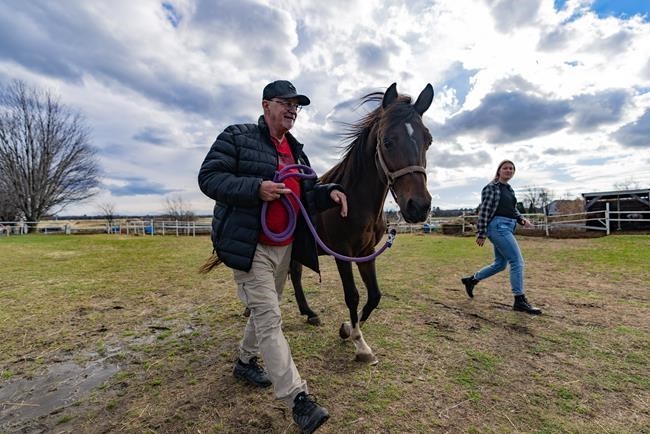
Christian, a Canadian Armed Forces veteran takes out a rescue horse, as social worker Marie-Pier Dusseault walks alongside, at Equi-Sens, a program which incorporates horses as a means of therapy for veterans facing post-traumatic stress, in Mirabel, Que., on Thursday, Nov. 6, 2024. THE CANADIAN PRESS/Christinne Muschi
November 10, 2024 - 12:18 PM
MONTREAL - Canadian Army veterans are healing their psychological wounds with some help from equine friends.
Since starting equine therapy last June, Christian has regularly visited Mirabel's Equi-Sens stable, about 33 kilometres north of Montreal, to see the horse that has helped him “to be at peace.”
“He's a horse who's been through trauma like me,” the veteran said while stroking mane of the stallion, who was rescued from an abusive environment. Christian spoke to The Canadian Press on the condition that his last name not be published, as he does not wish to reveal information about his health.
He added that he's named the horse after himself, due to their similar backgrounds.
Christian suffers from depression and has difficulty relating to others. Taking care of the horse offers him some relief, calming his anxiety and trauma after years of service in the Canadian Armed Forces.
“By managing to relate to the horse, I'm less afraid of relating to humans,” he said.
“Since then, I feel I'm not alone on the planet. The horse brings me peace. Now I'm less afraid. Before I was afraid of everything. When I passed someone on the street, I would cross to the other side to avoid talking to them."
Social worker Marie-Pier Dusseault said the horses “better equip veterans to manage their post-traumatic shock” because they force the soldiers to become aware of their physical and physiological symptoms.
Horses are not easily approached by people experiencing anxiety or nerves, which means veterans who receive equine therapy must be attuned to their symptoms and manage their emotions to successfully interact with the animal, he said.
During the 1980s, Christian was one of 5,000 soldiers in a battalion stationed in West Germany.
Although he never saw battle in his eight and a half years there, he said he suffered violence at the hands of fellow soldiers.
“I was getting beaten up every week,” he said, adding that his small stature made him a target, which contributed to making him increasingly aggressive over time.
On one occasion he said a fellow serviceman beat him and left him for dead.
Christian said alcohol and cocaine were a part of life in the army at the time and he suffered from alcoholism and depression. He was discharged from the forces 38 years ago, but his psychological scars have never healed.
While attending a substance abuse meeting last year, a veteran who served in Afghanistan told him about Le Sentier,an organization that offers support to veterans, including the program that introduced Christian to his equine friend.
Marco, another veteran receiving equine therapy at Le Sentier, served in the army between 1982 and 1989. Marco also spoke to The Canadian Press on the condition that his last name not be published, to keep his health information private.
He decided to get help after watching a documentary about how the Canadian Armed Forces employed institutional practices between the1950s and 1990s to purge members of the LGBTQ+ community from the army.
“Criminal acts were committed against me, but we couldn't go to the military police because if you told the military police you were gay, you'd get kicked out,” he said.
Marco said that one of his friends, a victim of those policies, took his own life.
He said that for many years he had internalized the “idea that it was normal to be assaulted in the army." He realized the extent of the violence he and his friends were subjected to after watching the documentary.
“Horses are an instrument, a tool,” Marco said, one that "brings us back to our humanity.”
Despite the violence he endured, Marco was proudly wearing the poppy, the national symbol of remembrance as well as a veteran’s jacket.
“I've always been proud to have done my military service, but I didn't say I was a veteran before,” he said, adding that he is now comfortable saying it because Veterans Affairs has recognized his post-traumatic stress disorder was linked to his military service.
Now, Marco said, he is committed to the cause of veterans, especially teenage soldiers who have suffered physiological and physical injuries on the line of duty.
This report by The Canadian Press was first published Nov. 11, 2024.
News from © The Canadian Press, 2024